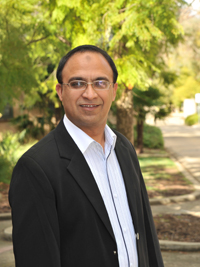* Australian Government funding to CSU to help eliminate barriers to women’s participation in STEM education and careers
* CSU project to address decline in women’s participation in ICT and cyber security
* Two-year project targets female students in 36 government and non-government high schools in Albury-Wodonga, Bathurst, Dubbo, Port Macquarie, Orange, and Wagga Wagga
* CSU a leader in cyber security education and training
 Charles Sturt University (CSU) has been awarded Australian Government funding to run a cyber security awareness project for girls in high schools in regional NSW.
Charles Sturt University (CSU) has been awarded Australian Government funding to run a cyber security awareness project for girls in high schools in regional NSW.
The ‘Girls in Cyber Security Advancing (GiCSA)’ project will be led by Associate Professor Tanveer Zia in the CSU School of Computing and Mathematics.
Professor Zia said the GiCSA Project received $236,689 of Australian Government funding, with a CSU contribution of $117,055 as part of the Women in STEM and Entrepreneurship Program, for a total investment of $353,744 to help eliminate barriers for women’s participation in Science Technology Engineering Medicine (STEM) education and careers.
“This project aims to develop a holistic cyber security awareness and training program for girls in Years 9-10 in regional NSW in order to influence the students before they decide on Year 11 and 12 subjects and future careers,” Professor Zia said.
“Developing the talents of women in STEM and information and communication technology (ICT) is vital for a strong and healthy economy, and to prepare the future generation for life challenged by fast-paced technological revolution.”
Professor Tracey Green, the Executive Dean of the CSU Faculty of Business, Justice and Behavioural Sciences, said this is a great example of the work CSU is doing in the cyber security and STEM space.
“Charles Sturt University now offers online masters programs for professionals working in the area of cyber security and investigation,” Professor Green said.
“We are proactively encouraging rural participation in STEM activities, and in June hosted Engfest at Charles Sturt University in Bathurst which attracted over 500 people from schools, industry, government and the community. We reached around 12,500 people via our Facebook page during the event, which demonstrates the level of interest.”
 Professor Zia (pictured) noted that the STEM workforce in Australia has the greatest attrition rates and many of those who leave these industries are women.
Professor Zia (pictured) noted that the STEM workforce in Australia has the greatest attrition rates and many of those who leave these industries are women.
“Research shows that women’s attrition from STEM and ICT in Australia begins in primary school, and women account for only one in four ICT graduates at the university level, a proportion that has been steadily declining since 2001,” Professor Zia said.
“To address this decline in women’s participation in ICT in general, and cyber security in particular, and to increase women’s participation in cyber security, this project will provide awareness and training to young girls and help them understand an industry which can provide flexible working environments suitable to women.”
Professor Zia observed that many women have significant misgivings about the work environment in the ICT sector. This includes the lack of workplace support, hostile working conditions, disparity in benefits compared with their male counterparts, discrimination and harassment, rotating shifts and weekend work which are not compatible for those with parenting and caring responsibilities.
“The project will introduce some of the flexible working aspects in ICT suitable for women,” Professor Zia said. “Overall, the project will provide well-structured training and awareness opportunities, and help increase participation of girls and women in STEM and entrepreneurship in the long run.”
The project will run for two years commencing in July 2018 and is aimed at female students in 36 government and non-government high schools in the six major regional towns in the CSU geographical footprint – Albury-Wodonga, Bathurst, Dubbo, Port Macquarie, Orange, and Wagga Wagga.
Professor Zia emphasised that a contributing factor for the success of the grant application was that CSU has a strong focus in cyber security training and research.
“This is evidenced from the University’s successful delivery of cyber security courses and being part of the Cyber Security Cooperative Research Centre (CSCRC),” Professor Zia said.
“This project closely aligns with the CSCRC activities and the University’s narrative ‘flourishing communities’ and our values by being impactful and engaging with our regions. The program will contribute immensely in training and inspiring young girls to aspire to cyber security related careers.”





Social
Explore the world of social